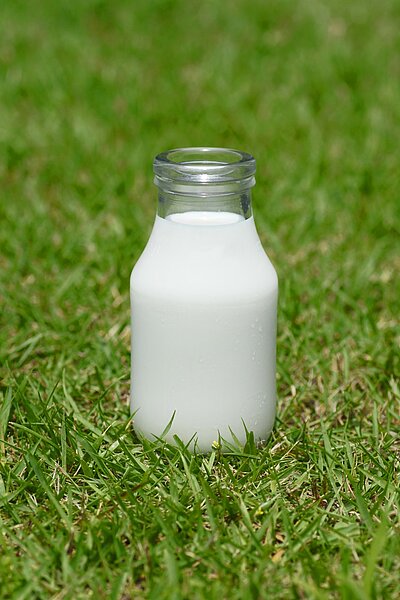Nisin

Nisin is a peptide produced by the bacterium Lactococcus lactis. It belongs to the group of lantibiotics, which have an antibiotic effect against gram-positive bacteria. Nisin occurs naturally in raw milk and is also used as a food additive E234 to preserve various foods such as pudding, cheese or processed cheese. But what does nisin have to do with dog food? In this article, you can find out more about this ingredient and its advantages and disadvantages for your dog.
What is nisin and how does it work?
Nisin is a small molecule consisting of 34 amino acids. It binds to the molecule lipid II, which is found in the cell membrane of gram-positive bacteria. As a result, it forms a pore in the membrane that allows ions and other molecules to enter and exit. This leads to the death of the bacterial cell. Nisin is particularly effective against bacterial spores that are highly resistant to other antibiotics.
Nisin has the advantage that it is broken down quickly and completely in the digestive tract and leaves no residue in the body. It is considered safe for healthy humans and animals as it has no negative effects on the intestinal flora or the immune system. The ADI value (acceptable daily intake) for nisin is 0.3 mg per kilogram of body weight.
Why is nisin used in dog food?
Nisin is used in dog food for two reasons: Firstly, to make the food last longer by preventing the growth of harmful bacteria. Secondly, to protect the food from contamination with bacterial spores that can lead to food poisoning or other illnesses. Nisin can be used in both dry and wet food.
Nisin has the advantage of being a natural preservative derived from a lactic acid bacterium. It is therefore an alternative to synthetic preservatives such as sorbic acid or benzoic acid, which are considered questionable by some consumers. Nisin is also tasteless and therefore does not affect the smell or taste of the food.
What are the disadvantages of nisin in dog food?
Nisin has few disadvantages in dog food, but there are a few points you should be aware of:
- Nisin is only effective against gram-positive bacteria, not gram-negative bacteria or fungi. This means that it cannot kill all possible microorganisms in the food and is therefore not sufficient on its own to ensure a safe diet.
- Nisin can cause allergic reactions in some dogs, such as skin rashes, itching or breathing difficulties. However, this is very rare and depends on the individual sensitivity of the dog.
- Nisin can impair the effectiveness of therapeutic antibiotics if administered at the same time. This is because nisin binds to the same target molecule as some antibiotics, reducing their effectiveness. So if your dog needs antibiotic therapy, you should make sure that he is not given food containing nisin.
Nisin is a natural preservative that is used in dog food to extend its shelf life and protect it from bacterial spores. It has an antibiotic effect against gram-positive bacteria and is quickly and completely broken down in the digestive tract. Nisin is considered safe for healthy dogs, but can trigger allergic reactions in some dogs or impair the effectiveness of therapeutic antibiotics.
If you notice any signs of hypersensitivity or poisoning in your dog, you should see your vet immediately. We are not a substitute for a vet, but we try to be as accurate as possible. Every dog reacts differently and we recommend you get a second opinion or consult your vet if in doubt.
Stay healthy and take good care of your four-legged friend!😊